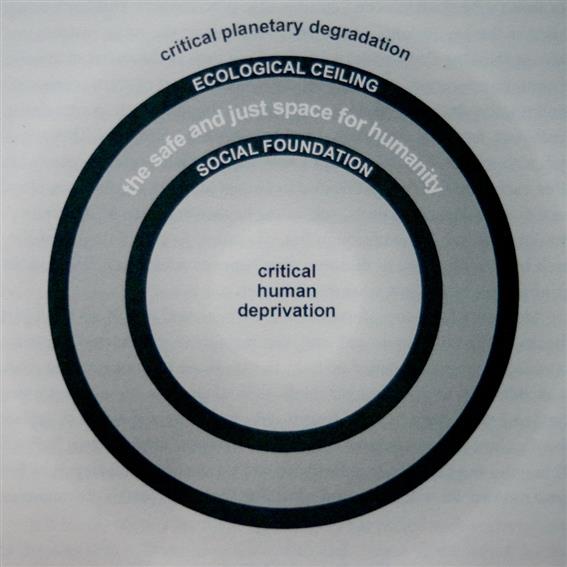
Have you ever wondered why our major political parties have such different views about how our economy works, indeed how the global economy works? Have you asked why progressives think so differently from conservatives? Have you pondered why their approaches to our economy are so radically dissimilar? Have you wondered why we never seem to be able to have a rational bipartisan discussion about economics?
This piece argues that in the nation’s economic nest there is a cuckoo – entrenched conservative ideology - too often based on outmoded economics, that continually tries to throw out the progressive fledglings and their ideology, leaving us with the economic dissonance that so bedevils our thinking, distorts our discourse, and inflames our passions. I’ll use a couple of examples to illustrate my argument.
 By way of background, let me relate some of what Kate Raworth says in the introduction to her book Doughnut Economics. She describes the reactions of a student, who having taken an economics course at Oxford University and later at the prestigious London School of Economics, found herself bitterly disappointed at the out-of-date content of the courses, content that did not prepare her for becoming a professional economist capable of understanding the complexities of the global economy; her courses were encumbered by a plethora of abstract theories and complex equations from a bygone era.
By way of background, let me relate some of what Kate Raworth says in the introduction to her book Doughnut Economics. She describes the reactions of a student, who having taken an economics course at Oxford University and later at the prestigious London School of Economics, found herself bitterly disappointed at the out-of-date content of the courses, content that did not prepare her for becoming a professional economist capable of understanding the complexities of the global economy; her courses were encumbered by a plethora of abstract theories and complex equations from a bygone era.
When the global financial crisis threw the world of economics into chaos, her teachers seemed to have no answers. They reverted to shop-soiled concepts, tired justifications, and out-of-date theories. The twin problems of human deprivation: hunger, illiteracy and inequality on the one hand, and environmental degradation and biodiversity loss caused by climate change on the other, both of which now feature so prominently in contemporary political thought, did not enter into their thinking.
Indeed it was these issues that led Raworth to develop a model of economics that she labelled: Doughnut Economics. She captured this diagrammatically via a doughnut-shaped figure with ‘critical human deprivation’ at its centre and ‘critical planetary degradation’ around the periphery.
To come back to our economics student, the upshot of the disparity between what students were being offered and what they believed they needed to function as economists in a contemporary world, lead to worldwide student dissent in 2014. In an open letter they declared:
The teaching of economics is in crisis, and this crisis has consequences far beyond the university walls. What is taught shapes the minds of the next generation of policymakers and therefore shapes the societies in which we live… We are dissatisfied with the dramatic narrowing of the curriculum that has taken place over the last couple of decades…it limits our ability to contend with the multidimensional challenges of the 21st century from financial stability, to food security and climate change.
The students targetted highbrow conferences with their protest. At the American Economic Association’s conference in 2015 they placed accusatory posters; they hijacked question time; they declared that the revolution in economics had begun; and they pledged to begin reprogramming what they called ‘the doomsday machine’ of economics. They warned that on campus after campus they would: “chase you old goats out of power”.
No other academic discipline has so provoked its students. Their rebellion brought the realization that not only must old ideas be debunked, but new ones brought forward to replace them. As inventor Buckminster Fuller insisted: “You never change things by fighting the existing reality. To change something build a new model that makes the existing model obsolete.” Does that remind of Lakoff’s adage: don’t try to change entrenched beliefs; reframe the problem in a more appealing and refreshing way?
Recalling the history of the economics students’ rebellion, Raworth wrote:
Humanity faces some formidable challenges, and it is no small part due to the blind spots and mistaken metaphors of outdated economic thinking that we have ended up here. But for those who are ready to rebel, look sideways, to question and think again, then these are exciting times.
‘Students must learn how to discard old ideas, how and when to replace them… how to learn, unlearn and relearn’, as wrote futurist Alvin Toffler. This could not be more true for those seeking economic literacy: now is a great moment for unlearning and relearning the fundamentals of economics.
How profoundly true this is, how crucial it is that not only economists, but businessmen, industrialists, and perhaps most of all our leaders, our decision makers, our politicians, unlearn outdated economics and learn the fundamentals of economics that apply to our contemporary world, our global economy, our world of human deprivation, inequity and environmental peril.
Let’s now study the conservative cuckoo’s entrenched beliefs, how they distort rational thinking about economics, and how they result in faulty decisions and flawed policy. To discover their beliefs, one has only to listen to what they say and do.
On the economic front, they believe in:
- unrestricted free enterprise
- the importance of private property
- the wisdom and power of free markets
- small government
- light regulation even though sound regulation protects the public from rampant entrepreneurship, profit gouging, environmental degradation, and lax occupational health and safety provisions
- the desirability of unrestrained growth
- the value of low taxes
- the value of reducing company tax for the top end of town, which they insist will result in greater investment, faster growth, more jobs, and the greatest charade of all – increased wages. The fact that they can muster no evidence to support the latter does not deter them – it’s an entrenched belief, an unchangeable conviction.
More generally, conservatives believe in:
- freedom of speech
- personal liberty
- family values
- tradition
- law and order, and the rule of law
- a hierarchy of authority – employer, worker; superior, subordinate; wealthy, deprived; privileged, underprivileged; property owner, tenant; powerful, weak; master, slave; regulator, regulated; powerful, powerless; leader, follower.
Against the background of the tumult that now afflicts the field of economics that I’ve described above, it’s easier to understand the conflict between conservative and progressive thinking. We can more easily recognize how the conservative cuckoo disrupts the economic nest.
Let’s begin with an everyday example – the Coalition’s push for a large reduction in company tax, not just for small businesses, which has bipartisan support, but also for the big banks and large multinationals.
Every day, PM Turnbull and Treasurer Morrison, and every minister asked about the tax cuts, sing from the same song sheet. They insist that it’s just common sense that reducing corporate tax will make companies more competitive on the world stage, and this will result in greater investment in Australia, more jobs and higher wages. They single out businesses that demonstrate this ‘incontrovertible fact’, don their fluoro vests and hard hats, and parade their targetted victims before the cameras to ‘prove’ that what they say is right.
They quote the latest job figures that show a substantial increase in jobs, especially full time jobs, somehow expecting us to associate this welcome news with the proposed tax cuts, which still have not passed in the Senate, almost as if jobs have increased in anticipation of the cuts! If that were so, why bother with them? When asked for historic proof that wages do indeed increase when company tax is cut, they have none. The best I’ve heard from their tame businessmen is that worker bonuses could increase or that profit sharing might boost wages. None talk of increasing wages, which have been static for many years.
The progressives try to counter the conservative line by questioning the value of giving $65 billion of tax cuts to big business, thereby inflating the deficit and postponing for years the prospect of a balanced budget, when that money could more valuably be spent on education, health, welfare, and public infrastructure.
That doesn’t stop the Coalition; they repeat their story, based as it is on the disproven theory of trickle-down economics. They do it every day, knowing that it is out-of-date, but aware that repetition eventually entrenches beliefs, no matter how flawed. And once entrenched, nothing will shift them. The cuckoo flaps its wings triumphantly.
If you need any more convincing, listen to Ben Oquist, Executive Director of
The Australia Institute expose the voodoo economics used to justify the tax cuts.
In a laudable indication of the perspicacity of the electorate though, the
March 13 Essential Poll showed that only 42% support corporate cuts despite all the Coalition propaganda they have been fed, and only 11% support this measure strongly. Moreover, 52% believe businesses will benefit most, while only 21% of respondents believe workers will, only 14% feel those on low income will, and 27% doubt if the economy overall will benefit at all. Even in Turnbull’s own electorate 68% oppose the cuts. All the verbiage that emits from government ministers
ad nauseam evidently has not convinced the people!
The people are right. Last week
The Sydney Morning Herald ran a story that reported on a secret BCA survey of Australia’s leading executives that found that fewer than one in five would use the proposed company tax cut to directly increase wages or employ more staff. Clearly more jobs and wage increases are not on their agenda, but boosting returns to shareholders or investing in the company is.
I could describe many conservative cuckoos that soil the nation’s economic nest with their outmoded concepts, but let me give you just one more illustrative example: the Coalition’s obsession with ‘growth and jobs’ no matter what the environmental costs. The conflict is never ending.
The proposed Adani coal mine is illustrative. It is favoured by the Coalition because of the jobs it is asserted it will create, and the prosperity it is said it will bring to northern Queensland. But advocates exhibit almost no concern for the likely environmental damage it will create in the Galilee Basin and the Great Barrier Reef on top of damage that has already resulted from global warming, insisting that ‘protections’ will be put in place. We’ve heard that before!
Whenever Adani is debated, as progressive fledglings tenaciously express their environmental concerns, they are kicked out of the nest by conservative cuckoos loudly chanting their ‘Jobs and Growth’ mantra, an expression of their entrenched belief in the dogma of unbridled growth, a leftover from a bygone era, dogma that ignores the resultant environmental degradation.
So there you have it – two examples of how the conservative cuckoos will always attempt to kick the progressive fledglings out of the economic nest. Sometimes this is because the conservative cuckoos are wedded to outdated or unproven theories of economics, such as trickle down; sometimes it’s because the cuckoos consistently prioritize growth and profit over the integrity of the environment.
I trust that the analogy I have drawn will be of use to you in understanding what is taking place during the endless, and often puerile debates between conservatives and progressives about the state of this nation’s economy.
Your comments will always be welcome.
Current rating: 5 / 5 | Rated 9 times